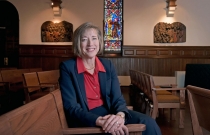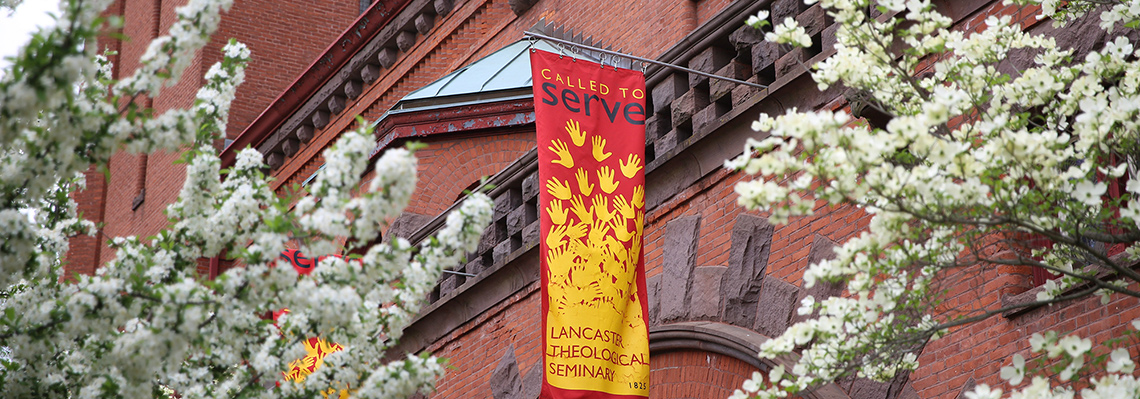President Lytch Leaves Legacy Of Accessibility, Inclusion
May 2, 2020
May 2, 2020 LNP feature by Earle Cornelius, photo by Dan Marshka

When the Rev. Carol Lytch was hired to lead Lancaster Theological Seminary in 2011, the institution was struggling with its finances.
Nine years later, the school has a $15 million endowment and is on track to complete a two-phase $9 million capital campaign to create student scholarships and restore the school’s historic campus.
It was a primary reason she was hired, said board member and former Millersville University President Francine McNairy-Nelson.
“She brought financial acumen with her in her reservoir of skills and has been able to place the seminary in a solid financial situation,” McNairy-Nelson said.
Improving the seminary’s financial footing has enabled the institution to sustain itself. But it has been Lytch’s willingness to adapt to changing conditions to make graduate education more accessible and more diverse that will allow the institution to grow.
Lytch will retire on June 30. She came to Lancaster after having served as assistant executive director of the Association of Theological Schools, which accredits seminaries in the United States and Canada.
Over the past nine years, she has overseen changes to curriculum that could never have been imagined when she began.
And nowhere is that more evident than in the current COVID-19 crisis, in which online learning is key.
Revamping curriculum
Several years ago, the seminary embarked on a bivocational Master of Divinity program offered in two tracks — weekdays and weekends. The hybrid program grew out of a recognition that many of the students were older and gainfully employed. The change allows students to continue to work at their jobs and attend classes. The school also launched a redesigned doctoral program.
Both programs make extensive use of online learning, which has attracted students from as far away as Mexico.
In the wake of the pandemic, the seminary’s online component has enabled students to continue their education seamlessly.
“I am proud of how quickly the seminary converted to online learning in the wake of COVID-19,” Lytch said from her office at the seminary. “A lot of credit goes to our faculty, to the staff behind the scenes who run the technology and also to the students themselves.”
The Master of Divinity degree, which most denominations require of pastors, is the seminary’s primary program. The creation of the two-track program not only made obtaining a degree more accessible, it also reduced student debt by cutting the time needed to obtain the degree.
“By creating this extra track and by making the program a little more predictable in its sequencing, we’re able to graduate students more quickly,” Lytch said. “We came up with the idea ourselves … and other seminaries have been interested to learn about it.”
Weekday students typically earn their degree in three years; weekend students in four years.
Another appeal of the hybrid program is that it attracts members of the “digital generation” who are quite comfortable taking courses online.
The doctoral program also has benefited from the online offerings. In 2019, the seminary awarded doctoral degrees to 12 students — its largest cohort.
Valuing diversity
McNairy-Nelson also credits Lytch for making diversity a goal of the seminary, extending to the faculty and staff as well as to the student body, she said.
“I like to be around the students when they talk about what they’re learning and why they’re at the seminary … how they feel even when they have a different perspective,” McNairy-Nelson said. “Whether they are progressive or conservative … whether you're talking about racial or cultural or LGBT or men and women, this seminary practices what it preaches. It opens its heart and doors to those who come from diverse backgrounds.
“You have to salute someone that has been able to build and make it an institutional value.”
Lytch and her husband, Stephens, who is serving as transitional pastor at Eastminster Presbyterian Church in York and who previously served as interim executive director of the Lancaster Council of Churches Food Hub, plan to remain in Lancaster. She has served on an ad hoc committee with other academic leaders created by the Lancaster Chamber to discuss how to improve the educational levels in the county to meet the ever-changing needs of businesses and industries in the county.
And while STEM (science, technology, engineering and mathematics) is seen as a key to maintaining the success and prosperity of the county and region, Lytch believes two additional letters need to be added — “A” for art and the contributions of the Pennsylvania College of Art & Design, and “R” — for religion — making the acronym STREAM.
“We’re in the business (of) the prosperity of the soul,” Lytch said of the seminary’s role. “What we contribute to the workforce is grounding our people in care for the common good and the marginalized of the city and those without equalized chances because of the legacy of racism and other oppressions.”
Lytch credits the faculty, most of whom have been at the seminary for 20 years or more, as a strength of the institution.
“Partly because we’re a small, nimble institution, there’s a great spirit of ‘we can do this,’ we can make it happen and there’s a lot of commitment to the mission of the seminary.”
Added McNairy-Nelson, “They want to be a part of the community so that the community sees (the seminary) as a resource.”
Parting advice
As the seminary board conducts a national search for her replacement — an interim president is expected to be hired before she retires — Lytch offered this advice to her successor.
“There’s a gift in this presidential role to bring leaders together to work collaboratively.
“Get to know the leaders, including the clergy, and accept the invitations that will be offered to be part of the community.”

